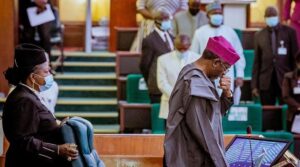Despite the full installation of electronic voting, the House of Representatives continues to pass key legislations through voice votes.

On Thursday, the lawmakers used voice vote to consider the Electoral Amendment Bill and incidentally the process was stalled.
Earlier, the Speaker of the House, Femi Gbajabimaila, said they would not use electronic voting because the “clauses are many.”
Mr Gbajabimaila said he received comments that the House ought to have used electronic voting on PIB and the yet -to-be passed electoral bill.
He stated that electronic voting can only be used for a single item piece of legislation, not a “400 clauses” bill.
Mr Gbajabiamila stated this in his remarks before the commencement of plenary on Thursday,
The Speaker had repeatedly promised the use of electronic voting in the House and committees proceedings.
It was even included in the legislative agenda before it was amended.
“It has been mentioned to me that landmark legislation such as the Petroleum Industry Bill (PIB) and the Electoral Act (Amendment) Bill ought to have been considered using the electronic voting system in the House.
“While I agree with this suggestion, e-voting usually in most parts of the world is meant for single item pieces of legislation not 400 clause considerations, except on reports that contain limited number of clauses. As such, it is not ideal for this bill.
“Nonetheless, I take the point and we will make sure that the system is fully deployed in advance of our resumption.”
The use of voice vote was the main reason there was stalemate during the consideration of the bill, as the Deputy Speaker, Idris Wase, kept on ruling against obvious “louder voices.”
Luke Onofiok (PDP, Akwa-Ibom), Kingsley Chinda (PDP, Rivers) and Ndudi Elumelu (PDP, Delta) all called for the division of the House to decide clause 52(2) during the consideration of the bill.
However, Mr Wase, who appeared to have an interest in the section, was adamant.
Following the rowdy session over Mr Wase’s actions, the consideration was adjourned till Friday.
Also, the report on the PIB is currently stalled as the House on Thursday stepped down the consideration of the conference committee which recommended three percent for Host communities development fund.
Mohammed Monguno, the chairman of the ad hoc committee, moved for the report to be stepped down following a rowdy session.